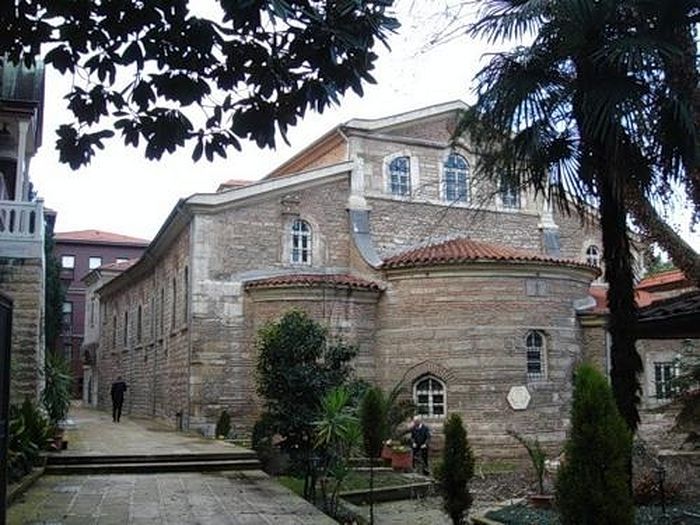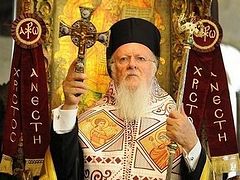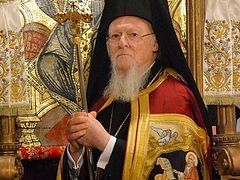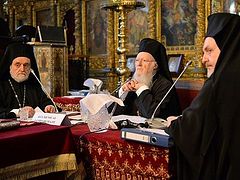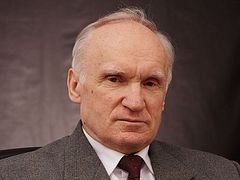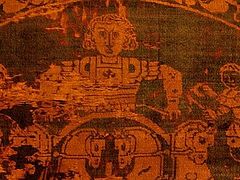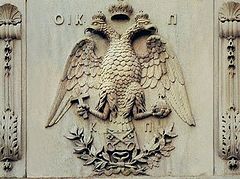The Journal of the Moscow Patriarchate continues its discussion of the crisis in inter-Orthodox relations and the uncanonicity of the decisions and actions of the Bartholomew Patriarch of Constantinople. In the April issue for 2019, that journal acquainted the reader with the historical background of what is currently going on. In this article, Doctor of Church history and doctoral candidate in historical sciences Priest Alexander Mazyrin explains, in his view, in what consists the theological error of the modern primate of the Phanar and why the canons do not give any exclusive rights to the Constantinople Patriarchs.
Therefore, brethren, stand fast, and hold the traditions...
(2 Thess. 2:15)
In recent months the Orthodox world has been experiencing a crisis on a scale that it has probably not experienced since the time of the Great Schism of a thousand years ago. The similarity is obvious. Just as it was then, the primary see (then Rome, now Constantinople) has made a claim that is unacceptable to Orthodox consciousness: that it occupies an exclusive position and has authoritarian primacy over the other Local Churches. Back then it led to the separation of the Roman popes from Orthodoxy, and now the Constantinople Patriarchate has stepped on that same path.
First without equal?
The Ukrainian Church question, which is now at the epicenter of the conflict, has a significance that is by no means merely local. It has revealed a problem of particular scale and exposed distortions in the Phanar’s ecclesiology that cannot be classified as anything other than a heresy.
The Constantinople Patriarch has directly proclaimed himself the head of all Orthodox patriarchs and primates, and now not only as a private opinion, but more than officially—in a Tomos “granting autocephaly” to the so-called Sacred Church of Ukraine. By insisting along the lines of the Roman popes’ longtime example that he is the head of the entire Orthodox Church, to what place does the Constantinople Patriarch relegate Christ, Whom the Church from apostolic times has confessed to be its Head (Eph. 1:22)?
In proclaiming himself the head of the entire Orthodox Church, Patriarch Bartholomew supposes that he can make what was into what was not (revoke the transfer of the Kiev Metropolia to the Moscow Patriarchate that took place 300 years ago) and, to the contrary, make the nonexistent into existent (to make with the mere flourish of a pen the graceless false hierarchy of the Ukrainian schismatics into ones having grace).
By accepting schismatics and the semi-self-ordained1 in their “existing rank” and granting them “autocephaly”, Patriarch Bartholomew is at the same time ignoring the canonical Ukrainian Orthodox Church, despite the fact that it far surpasses in numbers of parish and worshippers all the various local autocephalists taken together, and even the Constantinople Patriarchate itself. Moreover this is being done in obvious contradiction to the position of all the other Local Churches2 and in categorical refusal to submit the matter to a Pan-Orthodox decision.
Patriarch Bartholomew and his apologists are openly proclaiming and embodying a teaching that out of the primates of the Orthodox Churches, supposedly they are not the first among equals but the first without equal (primus sine paribus).3 Moreover they are claiming that the source of his primacy is not the Church, but he himself, like God the Father in the Holy Trinity.4 What is this if not an ecclesiological5 heresy? A heresy that is deepened even further by its distortion of the Orthodox teaching on God the Trinity, inasmuch as the historically conditioned changeable interrelations of the Local Churches in this false teaching are being compared to an inter-Trinitarian relationship—a relationship that takes on an element of subordinationism (co-subordination),6 which is already a step towards Arianism.7
As the basis for the Constantinople Patriarchs’ supposedly exclusive rights are cited the 9th and 17th canons of the Fourth Ecumenical Council. In them is stated that if someone be “offended by his metropolitan”, he can take it for judgment to the Constantinople throne. However, according to the explanation of the most authoritative canonists (Greek ones, we must note), this is not at all about this throne’s universal jurisdiction, and Constantinople patriarchs can hear appeals from “offended” clerics only within the boundaries of their own territory, which, according to canon 28 of that same Council, is limited to the Pontan, Asian, and Thracian provinces (now within in the main territory of modern Turkey).
Thus, John Zonaras (twelfth century) said plainly that “the Patriarch of Constantinople is not placed as judge over all metropolitans without exception, but only over those under submission to him.” Further he explains that the metropolitans of Syria are to be judged by the Patriarch of Antioch, those of Palestine by the Patriarch of Jerusalem, and those of Egypt by the Patriarch of Alexandria.8 St. Nicodemos the Hagiorite (eighteenth to nineteenth centuries) in his explanation of the “Pedalion” (the “Rudder”) wrote absolutely unambiguously that the “Constantinople primate is the first and only judge over the metropolitans in submission to him—but not over those who are in submission to all the other patriarchs.”9 Thus, the canons do not give the Constantinople patriarchs any kind of exclusive rights.
It should also be noted that that same canon 17 of the Fourth Ecumenical Council, to which the Phanariots so like to refer, talks about the statute of limitations on bishops’ appeals for claims concerning the boundaries of canonical territories as being thirty years. If the Constantinople patriarchs had any pretenses against the Moscow patriarchs concerning the Kiev Metropolia, they had to announce them 300 years ago. And it is even more absurd when they say that the Phanar can “revoke” the Moscow Patriarchate’s autocephaly, which was confirmed at a council held in the sixteenth century.
The background and prehistory of the current crisis
Although even a year ago hardly anyone could have imagined such a rapid deterioration of relations in world Orthodoxy, the escalating crisis is not an accident and can in no way be laid at Patriarch Bartholomew’s feet alone. We can say that it has ripened over the course of decades and even centuries. In part, its premises are of an ethnophyletistic (the preference of national interests over the interests of the whole Church.—Ed.) character, and in part geopolitical. There is also an element of corruption at play here.
The most profound, almost perennial factor disrupting Church unity is the cultural-religious chauvinism present amongst certain Greek Church figures, which they have exalted with the name, Hellenism. Of course, no one can deny the greatness of Byzantine Christian culture or ignore the fact that the books of the New Testament and the larger part of all patristic writings, the resolutions of the Ecumenical Councils, the liturgical monuments, and many other very important works of ecclesiastical literature appeared in the world in the Greek language. From the moment of its appearance, the Church of Christ has come into close contact with the world through Hellenic culture, and much has been drawn from that culture.
However, regardless of all that, the Church has since apostolic times unalterably confessed that in Christ there is neither Greek, nor Jew, nor Scythian (cf. Cor. 3:11). Not one nation, no matter what imprint it has left on Church history, can claim some sort of religious exclusivity and demand primacy over other Christian peoples and their submission based on that supposed exclusivity. Nevertheless, such claims have been and are being sounded by Greek spiritual leaders (not all, of course).
The volume of these Hellenic claims to ecclesiastical lordship has been first of all determined by political circumstances. Naturally, after the Turks conquered Constantinople, when Russia became the only Orthodox kingdom, to whose intercession the Greeks were continually forced to have recourse, the Phanar, like it or not, had to moderate its ambitions with regard to the Russian Church. Meanwhile, other Orthodox peoples on the territory of the Ottoman Empire had to experience full oppression not only from the Turks, but also from the Phanariots.
In 1917 the Orthodox monarchy in Russia was toppled, after which the Russian Church went from being protected by the government to being cruelly persecuted. Practically at the same time, Turkey sustained a serious defeat in the First World War, and the Greeks found themselves on the side of the victors, hoping that they would soon be able to bring to life their “Grand Idea” of reviving their sovereign nation’s former greatness with its capital in Constantinople. In the official publications of the Constantinople and Alexandrian Patriarchates, passionate articles were circulated, saying that “the Greek nation will be happy and proud to behold” how Constantinople “will become, finally, the center of Orthodoxy, and its bishop, exalted over nations and tribes, will become the visible head and common connecting link for all Orthodox federal Churches.”10
The Greeks had then placed strong hopes in Great Britain for their final victory over the Turks, and the Phanar tried to develop the closest possible ties with the Anglican Church in order to strengthen this alliance, expressing their readiness to make all kinds of concessions. According to the memoirs of one Anglican bishop who was conducting negotiations with the Phanariots in 1920, they said to him unabashedly behind the scenes, “If England can get the Hagia Sophia for us, we will recognize any ordinations and agree to practically any teaching.”11
Just the same, in the critical moment, England did not help. The Greek army’s mad march into the depths of Asia Minor (with the attempt to seize not only coastal Ankara) catastrophically ended in 1922. After this the question arose as to whether the Constantinople Patriarchate would even be able to remain in its historical homeland. Times began for the Phanar of, on the one hand, the struggle for survival, and on the other, unbridled expansion all over the whole world in attempts to compensate for what it lost on its own canonical territory, through acquisitions into other places and at the expense of other Local Churches—primarily at the expense of the Russian Church under Bolshevik oppression.
In that situation, the Phanar’s involvement with the schismatic renovationists who appeared on the Russian scene in 1922 becomes quite explainable. The mass of Orthodox people in Russia viewed the newly-appeared schismatics with repugnance, seeing in them enablers of the militant atheists. But the renovationists were interesting to the Phanar in that, on the one hand, they were ready to support its authoritarian claims in the Orthodox world (something they could not expect to get from His Holiness Patriarch Tikhon, against whom the schismatics were waging war), and on the other hand, through them it was convenient to ask the Bolsheviks for aid, inasmuch as the Bolsheviks not only held the power over Russia in their hands, but had even gained particular influence over the Kemalists who were victorious in Turkey. The renovationists’ pronounced ecclesiastical modernism was likewise interesting to the Phanar in light of its planned reforms, which were intended to bring the Orthodox Church closer to the heterodox (calendar reforms, etc.).
No sooner had the self-formed renovationist “Supreme Church Administration” appeared than the chief Bolshevik curator of the schism L. D. Trotsky was informed that the Moscow representative of the Constantinople Patriarchate Archimandrite Yakovos (Dimopoulos) had rushed to inform the renovationists that “his lord, His Holiness the Ecumenical Patriarch” (Meletios Metaxakis.—Auth.) could come to the council in Moscow, recognize the Supreme Church Administration, participate in the judgment against Patriarch Tikhon, and in a word, do everything that the Supreme Church Administration needed, even unto the deposition of Tikhon, “according to all the canons.” He let them know what this would cost: by “His Holiness’s” arrival in Moscow, the return to him of the house of the Constantinople Patriarchate and 10,000 Turkish lyra.”12
It must be supposed that it was not the money, nor even the rebuilding of the former Constantinople Patriarchal metochion that had earlier been used as an apartment rental property but was now a municipal building, which attracted Patriarch Meletios personally, but the opportunity to demonstrate to the whole world that the Patriarch of Moscow was subject to his judgment, so that he might confirm his primacy of power once and for all.
Nevertheless, other representatives of the Phanar, in their traditional manner, did not forget about the material side of the deal either. Thus, the successor to Meletios (Metaxakis), Patriarch Gregorios VII, signed in 1924 a Tomos of autocephaly of the Polish Church (of course, without any agreement from the Russian Church), for which, as it is documentarily proven, the Polish government paid the Phanar 12,000 pounds sterling in its dollar equivalent. The prime minister of Poland Władysław Grabski inquired as to “whether they might receive the blessing less expensively”, but it was explained to him that, “in analogous situations in the past, the Phanar demanded significantly larger sums.”13 Moreover the 12,000 pounds were paid for only a copy of the Tomos given to the Polish ambassador. The document itself was yet to be solemnly brought to Warsaw, which came to pass the next year and cost the Polish treasury no small sum spent on the reception and gifts to the high-ranking Greek delegation.
In the 1940’s, as a result of the Second World War, the political situation again underwent essential changes. The soviet leaders turned away from the course they had earlier taken to destroy the Russian Orthodox Church and even began to help bolster its position abroad.14 The Constantinople Patriarchate could no longer ignore it as it had during the 1920s–30s.
At the same time, the Phanar totally reoriented itself on the United States, which was able to place the American archbishop Athenagoras (Spirou) on the Constantinople cathedra. He said plainly to the General Consul of the USA in Instanbul that he sees the “cornerstone” of his activity as patriarch to be the “promotion of American ideals”. The American diplomat was even shocked at such candor and wrote to the State Department, “I was inclined to recommend that we do all that depends on us in order to impart more subtlety to the Patriarch’s expressions of his quite understandably pro-American disposition, and to build our future relations with him very tactfully in order to avoid having him be too closely associated with us.”15 Verbal “subtlety” perhaps increased in the Phanar after this, but its association with the American government never disappeared.
In recent years, as can be seen, it seemed to Patriarch Bartholomew and his retinue that the geopolitical circumstances have become the most favorable for the realization of the Phanar’s longstanding desire to confirm its hegemony in world Orthodoxy. At first an attempt was made to achieve this goal “in a nice way” through the Council of Crete, the point of which consisted in, obviously, not the signing of several declarations, but in the ratification of a new model of governing the Orthodox Church with the Ecumenical Patriarch at the head, having no equals.
After this plan was foiled by God’s mercy, the Phanar switched to fighting for its total power “in a not nice way”, taking advantage of the West’s course of isolating Russia, and the Ukrainian leadership’s desire to tear up the last vestiges of ties between Kiev and Moscow. Here it is perfectly clear that the Phanar itself is making use of powers that are hostile toward the Orthodox Church to destroy it from within.
How should we react to Constantinople’s hostile actions?
The Russian Orthodox Church does not fight for primacy, power, territory, or anything of the sort. The idea that found expression in the sixteenth century of “Moscow the Third Rome” is not an ideology of the Russian Orthodox Church, which remains apolitical. As the holy Patriarch Tikhon wrote back in 1923, “Any attempts, no matter which side they come from, to throw the Church into a political struggle should be rejected and condemned.”16
Needed of course are organizational solutions that would guard the Church from the danger of papism. Understandably, that model of inter-Orthodox cooperation, which is built upon a particular empowerment of the Constantinople Patriarch and to which the Russian Orthodox Church nearly agreed on the threshold to the Council of Crete, has lost its relevance. The Constantinople Patriarch used the great trust shown to him for evil—for the authorization of his ecclesiological heresy. Agreeing after this to his exclusive rights would mean condoning this heresy.
It is imperative to stand up for the purity of canonical tradition preserved by the Orthodox Church and repel all attempts at any papist perversion, be it from the West or from the East. There must be a detailed and all-encompassing exposé of the dogmatic, canonical, and moral-ethical bankruptcy of the Constantinople Patriarchate’s claims and actions. Especially since Patriarch Bartholomew himself has driven away even those who were formerly quite loyal to him (for example, the Russian Western European archbishopric).
If the Russian Orthodox Church will stand firm in Christ’s truth, all sincerely Orthodox people, including Greeks, will be convinced of the outrageous wrongness of Patriarch Bartholomew and those with him. Then the Church crisis that Constantinople has provoked can be overcome.

